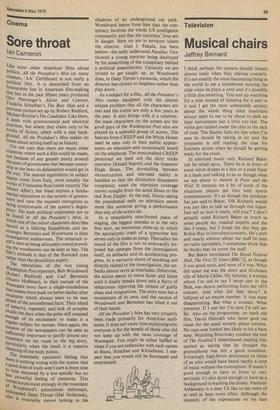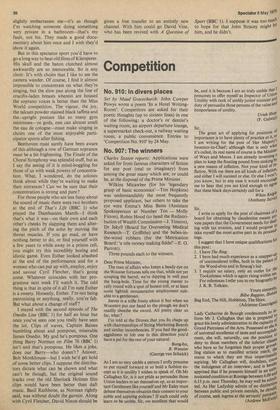Television
Musical chairs
Jeffrey Bernard
I think perhaps the camera should remain almost static when they televise concerts. It's not exactly the most fascinating thing in the world to see a trombonist moving the slide when he plays a note and it's possibly a little disconcerting. You end up watching for a note instead of listening for it and to it and I get the most unbearable anxiety about the whole thing since musicians always seem to me to be about to pick up their instruments just a little too late. The violin gets tucked under the chin in the nick of time. The flautist licks his lips when I'm sure he should be taking in air and the tympanist is still reading the clue for fourteen across when he should be getting ready for the crash.
In televised music only Richard Baker can be relied upon. There he is in front of some velvet drapes in a box or a posh foyer in a hush and talking to us as though what we are about to receive is Peter and the Wolf. It reminds me a bit of some of the situations players get into with sports commentators. It's as though the producer has just said to Baker, 'OK Richard, would you just like to talk us through this fugue. Just tell us how it starts, will you?' I don't actually mind Richard Baker as much as some people do, musical experts and the like I. mean, but I dread the day they get Robin Ray to introduce concerts. He's arch and nearly whimsy about the stuff he puts on radio turntables, I sometimes think that he thinks that he wrote the stuff.
But Baker introduced The Royal Festival Hall, The First 25 Years (BBC 2), as though it was good news, and most of it was. What did upset me was the short and ill-chosen clip of Maria Callas. My heroine, a woman whom I'm sad to say I never saw in the flesh, was shown performing from her 1973 concert. And what did they show ? A lollipop of an encore number. It was most disappointing. But what a woman. What presence. If I met her I'm sure I'd call her Sir. Also on the programme, on stark old film, David Oistrakh who never gave me cause for the usual anxiety about soloists. No man ever looked less likely to hit a bum note. Watching Stravinsky conduct the end of The Firebird I remembered reading him quoted as saying that he thought the gramophone was not a good invention. Irritatingly high-flown sentiments to those of us who would have heard hardly a note of music without the contraption. If music's good enough to have to listen to very seriously it's also good enough to have as a background to washing the dishes. Vladimir Ashkenazy is a man I'd like to see more of as well as hear more often. Although the intensity of the expressions on his face
slightly embarrasses me—it's as though I'm watching someone doing something very private in a bathroom—that's my fault, not his. They made a good documentary about him once and I wish they'd show it again.
But in this spectator sport you'd have to go a long way to beat old films of Klemperer. His skull and the baton clutched almost awkwardly are so memorable. So is any choir. It's with choirs that I like to see the camera wander. Of course, I find it almost impossible to concentrate on what they're singing, but the slow pan along the line of crucifix-laden breasts wherein are housed the soprano voices is better than the Miss World competition. The vigour, the joy, the talcum powder stained black taffeta and the • upright posture like so many gym mistresses—ye gods, one can almost smell the eau de cologne—must make singing in choirs one of the most enjoyable participator sports after fishing.
Beethoven must surely have been aware of this although a row of German sopranos must be a bit frightening. The Finale of the Choral Symphony was splendid stuff, but as I say the seeing of it is mind-boggling for those of us with weak powers of concentration. What, I wondered, do the soloists think about while they're waiting to make their entrances ? Can we be sure that their concentration is strong and pure ?
For those people who are less fussy about the sound of music there were two brothers at the end of That's Life (BBC 1) who played the Dambusters March--I think that's what it was—on their own and each other's cheeks by slapping them and altering the pitch of the echo by moving the throat muscles. If you go mad, or have nothing better to do, or find yourself with a few years to while away in a prison cell, you might try this incredibly boring and idiotic game. Even Esther looked abashed at the end of the performance and for a woman who can put up with, employ, enjoy and savour Cyril Fletcher, that's going some. Whatever coincides with her programme next week I'll watch it. The odd thing is that in spite of it all I'm sure Esther is a sweety. Honestly, Esther. I'm not being patronising or anything, really, you're fab. But what about a change of staff?
I stayed with the second episode of The Onedin Line (BBC 1) for half an hour but once you've seen one you really have seen the lot. Clips of waves, Captain Baines bumbling about and pompous, miserable James Onedin. My god he's pompous. One thing Barry Norman on Film 76 (BBC 1) isn't and that's pompous. He likes a joke, does our Barry—who doesn't ? Answer, Bob Monkhouse—but I wish he'd get hold of some better clips. I suppose the distributors dictate what can be shown and what can't be though, but the original sound tracks over the old Sherlock Holmes film clips would have been better than daft music. Basil Rathbone, as Norman rightly said, was without doubt the guvnor. Along with Cyril Fletcher, David Nixon should be given a free transfer to an entirely new channel. With him could go David Vine, who has been revived with A Question of Sport (BBC 1). I suppose it was too nutc,11 to hope for that John Stracey might hit him, and he didn't.



































 Previous page
Previous page